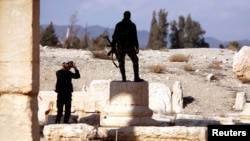U.S.-backed Syrian fighters have taken control of the only major road linking Raqqa, the de facto capital of Islamic State (IS), and Deir Ezzor province, which is partially controlled by the militants.
The Britain-based Syrian Observatory for Human Rights said the Syrian Democratic Forces (SDF) cut off the route Monday.
SDF fighters relaunched their offensive to retake Raqqa Sunday after a one week break.Their strategy includes isolating the city from Deir Ezzor in eastern Syria, and to take control of more territories along the Euphrates river en route to Raqqa.
“In the past week, we had a chance to regroup our forces and bring them to a high level of readiness,” the SDF said in a statement.
The anti-IS force seized at least seven villages in Deir Ezzor province Sunday after fierce clashes with IS fighters, according to a local commander who spoke to VOA on condition of anonymity.
“Our advances on IS in Deir Ezzor have been very rapid, and we expect to liberate larger areas this week,” the commander added.
IS is retreating
The commander said IS fighters lack the ability to attack and face advancing SDF forces, and are retreating from the area.
SDF made the advances against Islamic State with the help of U.S. close-air support, and coordination between SDF and the U.S.-led coalition continues with the aim of isolating Raqqa, according to SDF.
While SDF claims its week-long halt of operations against IS was due to weather conditions, analysts believe the group was awaiting a “green light” from the U.S. government to move forward with the offensive.
“The SDF has been getting the bulk majority of American support,” said Khorshid Alika, a Syrian researcher who closely follows the offensive. “This will only continue in the days ahead in the Raqqa campaign.”
US support may increase
Reports from the region suggest the U.S. is likely to increase its military support for the Syrian Kurdish and Arab fighters within the SDF, which could including artillery, arms supplies and other weaponry.
U.S. President Donald Trump recently received a plan regarding the Raqqa offensive after he had given the Defense Department 30 days to prepare it. The plan reportedly includes a significant increase of U.S. Special Operations Forces against the group, The Washington Post reported. The U.S. currently has 500 trainers deployed who advise local partners.
Turkey, a NATO ally, has repeatedly voiced opposition to a Syrian Kurdish participation in the Raqqa operation and has criticized the U.S. for providing military support to the Syrian Kurdish fighters in the SDF.
Ankara views the Kurdish YPG, the main group in the SDF, as a terrorist organization and fears any Kurdish advances in northern Syria would empower the Turkey-based Kurdistan Workers’ Party (PKK) that has been waging a decades-long insurgency.
Chairman of the U.S. Joint Chiefs of Staff General Joseph Dunford assured his Turkish counterpart General Hulusi Akar last month at NATO's Incirlik airbase in southern Turkey that the United States is considerate of Turkey’s concerns and that it chooses Kurdish fighters with care when lending support to rebels fighting Islamic State.
But Turkey continues to claim the U.S. is actively supporting YPG, which Turkey views as an ally of the outlawed PKK. Both the United States and Turkey view the PKK as a terrorist organization.
Analysts suggest, however, that Turkey’s objection to a Kurdish participation in the Raqqa offensive would soften after recent Turkish military gains in parts of northern Syria.
“Turkey’s primary goal was to prevent the YPG from forming a contiguous Kurdish entity in the Syria-Turkey border region,” researcher Alika said. “Now that its goal has been achieved, I don’t think Turkey is concerned with having the Kurds lead the operation to liberate Raqqa.”
Last week, Turkish troops and their Syrian rebel allies moved closer to the Kurdish-held town of Manbij in northern Syria after they pushed out IS from the nearby town of al-Bab.





